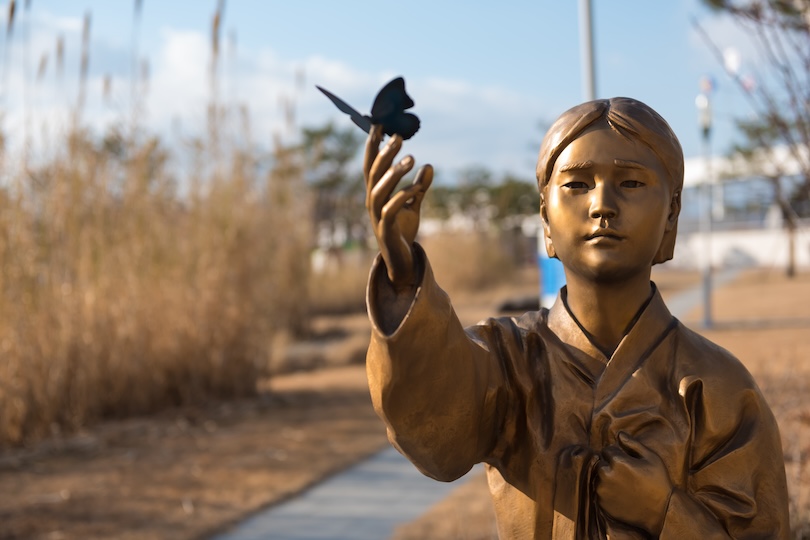On a poignant day marked by the passage of time, Could 10, 2023, noticed the farewell of the final Taiwanese lady entangled within the grim legacy of Japan’s World Conflict II consolation girls system, departing this world embraced by her family members. In a respectful nod to her needs, her household selected to attend till put up the memorial service on Could 23, 2023, to announce her passing, emphasizing her want to not be memorialized solely as “Taiwan’s final surviving consolation lady.” Her life’s narrative, in any case, prolonged far past that singular identification. Coming ahead in 1992 alongside 57 different courageous souls, they have been acknowledged as real victims of the grievous abuses perpetrated by the Japanese Imperial Military throughout the epoch of World Conflict II. That 12 months, in a revelatory transfer, Japanese MP Eiko Ito dispatched three cables that forged mild on these darkish chapters, sharing affirmation that way back to March 12, 1942, the Imperial Military Command in Tokyo had been implicated in soliciting 50 Taiwanese Aboriginal transportation allow purposes.
The brave account shared by former South Korean consolation lady Kim Hak-soon on August 14, 1991, galvanized Seoul and Beijing, spotlighting the harrowing ordeal confronted by Korean and Chinese language girls and ladies ensnared within the clutches of sexual slavery by the Japanese army throughout World Conflict II. Whereas this revelation served as a catalyst for outrage and requires accountability, Taiwan has navigated its path in the direction of in search of justice with a notably extra measured demeanor, however the pervasive concern instilled by the proximity of Kinmen Island to mainland China and the looming specter of territorial encroachment. In current developments, the island nation has skilled a bolstering of help from Japan, an ally more and more seen as a bulwark safeguarding Taiwan’s future sovereignty.
The journey in the direction of redress and recognition for the victims of the consolation girls system and their descendants has been fraught with complexities, not least because of the intricate divisions inside Taiwan’s Han populace, which includes 98% of its citizenry. These societal fissures date again to historic migrations and loyalties, together with these originating from the period of Ming loyalist Zheng Chenggong’s resistance in opposition to Dutch colonizers in 1662 and the next Qing Dynasty’s battle to claim management over Taiwan. Such historic layers underscore the nuanced challenges Taiwan has confronted, additional sophisticated by the post-World Conflict II period below Kuomintang rule marked by repression, culminating within the horrors of the “white terror.”
The aftermath of World Conflict II ushered in an period of tumult for Taiwan, as evidenced by the repugnant “228 Incident” and the extended brutality of Chiang Kai-shek’s dictatorial governance. These darkish intervals have been etched into the collective reminiscence of the Taiwanese folks, serving as a grim harbinger of the potential perils that would ensue ought to their democracy falter below new threats. The shadow of Chiang Kai-shek’s authoritarian legacy looms giant, with efforts underway to reckon with this previous by means of the relocation and eventual removing of his statues, an emblem of an period Taiwanese society is raring to transcend.
Whereas the Democratic Progressive Social gathering has traditionally tread flippantly across the consolation girls problem, probably viewing it as a diplomatically delicate impediment to sustaining sturdy ties with Japan, there was a discernible shift in narrative. The Chinese language Nationalist Social gathering, below leaderships resembling President Ma Ying-jeou’s, has supplied expressions of remorse over Taiwan’s oppressive historical past, even because it seeks to contextualize this era throughout the broader saga of Japanese occupation and the imposed atrocities, together with the compelled conscription and enslavement of 1000’s of Taiwanese Han and Aboriginal girls.
But, the hunt for justice and recognition for the Taiwanese victims of the consolation girls system has struggled to realize the momentum witnessed in counterparts like South Korea and China. Regardless of restricted state help, civil society initiatives such because the Taipei-based Ama Museum have endeavored to protect and honor these girls’s legacies, although challenged by exterior components just like the COVID-19 pandemic. These efforts underscore the continuing battle to combine these painful histories throughout the wider discourse on human rights in Taiwan.
As Taiwan navigates its up to date political panorama, with leaders like Lai Ching-te championing the trigger for justice for the consolation girls, there lies a profound alternative to forge a nuanced, respectful dialogue with Japan on this delicate problem, bridging the divides between historic narratives and political affiliations, in the direction of a path of reconciliation and shared understanding.
*This considerate evaluation attracts upon insights from Dr. Ward’s enlightening presentation at Columbia Regulation Faculty’s “Legacy of World Conflict II Consolation Girls in Asia and the Pacific” discussion board in February 2024, shedding mild on the complicated interaction of reminiscence, justice, and geopolitics within the ongoing discourse on the consolation girls problem.















